SIXTH FORM
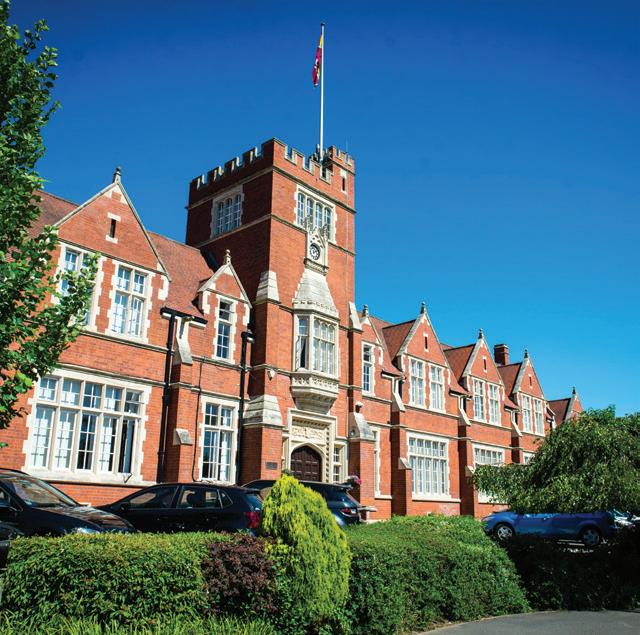






















Sixth Form is one of the most formative periods of school life, and choosing the right place to study is one of the most important decisions you’ll make in your education.
It’s a time when you’ll discover where your true passions lie and start to make the choices that will determine the direction of your life for years to come. You’ll gain greater independence, both as a learner and as a member of the wider school community, and take on more important responsibilities outside the classroom.
Our Sixth Form is a dynamic, diverse and vibrant community, in which new friendships are forged. Our students are united by their common desire to work hard and succeed both in and out of the classroom.
Mr Andrew Wright, Headmaster




Academic standards are high and we have a very successful track record in supporting our students to progress to high tariff courses, including Russell Group universities, medical courses, Oxford and Cambridge, and prestigious degree apprenticeships.










Above all, Sixth Form is an immensely exciting time; a period in which you will develop your existing talents and discover new ones. It is our privilege to support you on that journey.











One of the most successful Sixth Forms in the region, our dedicated and enthusiastic team of knowledgeable and inspirational staff provide an inspiring and supportive environment in which students thrive academically, personally and socially. It is an exciting place to be: the two years are packed full of new experiences and opportunities and, along with hard work, there is plenty of time for fun too.


I look forward to welcoming you to Bablake Sixth Form.
Mrs Helen Billings, Head of Sixth Form

We are also proud of the breadth of our co-curricular and enrichment programmes, which are just one of the key ways we promote personal growth and draw out individual talent wherever it lies. You’ll also be given leadership opportunities and become a powerful role model for younger pupils.









Our Sixth Form provides an outstanding and inspiring environment for those who are eager to fulfil their potential.
Students at Bablake study three A Levels and embark on an EPQ. Some study four, usually Further Mathematics. Our specialist staff have extensive experience of teaching up to Oxford and Cambridge entrance level and preparing students for the next stage of their lives.
In the Sixth Form students enjoy working in smaller classes, and are expected to complete a significant amount of independent and collaborative work in private study or at home. There is a clear shift towards greater challenge and extended thinking. Our dedicated Sixth Form Learning Mentor works closely with individuals and groups to support academic progress.
The Sixth Form Centre is a modern and attractive working environment with its own café, a common room and an independent study centre. We also have extensive and modern sports, music and drama facilities both on site and at our playing fields and synthetic turf pitches nearby.
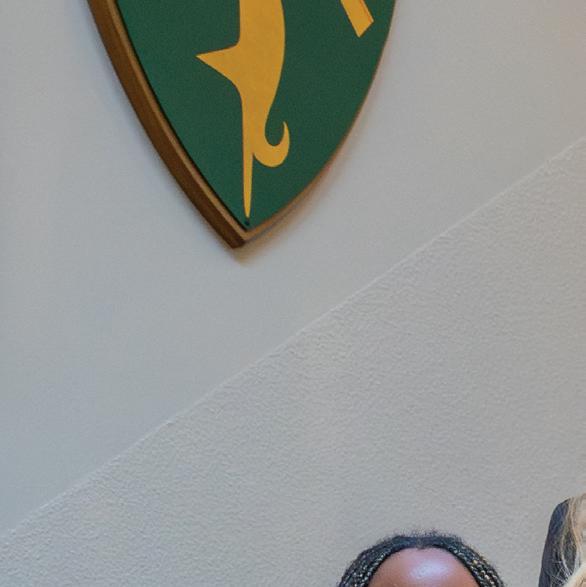

Students wear smart, business-like dress which is appropriate for a working environment rather than school uniform, thus supporting the transition to adult life.


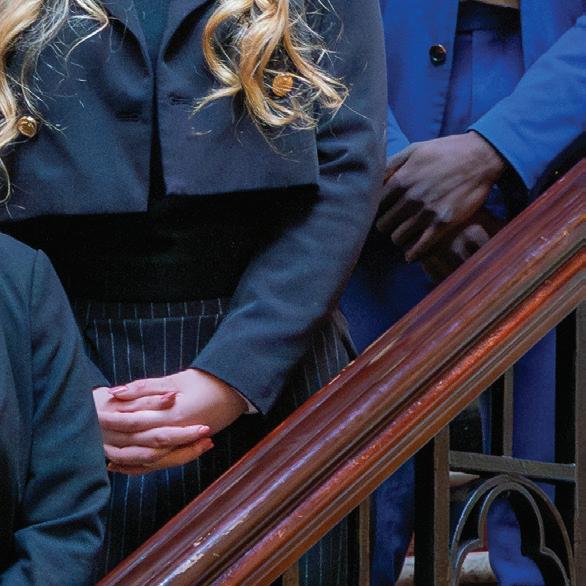


• 100% of students wanting to go to university gained a place last year with others gaining competitive apprenticeships.
• Yearly success with Oxbridge and Russell Group University applications (c.70% of students).
• Small class sizes with inspiring and dynamic teaching from highly qualified, specialist staff.
• Supplementary extension classes, individual support and workshops.
• Extensive careers support: UCAS applications, Mock Interviews, medics’ preparation, access to Alumni networks.
• Outstanding enrichment programme: Beyond Bablake
• Excellent pastoral care and tutor support.
• Attractive ‘green’ setting, blending tradition with modern facilities and a dedicated Sixth Form Centre.
• Academic, Art, Performing Arts and Sports Scholarships available.
• Outstanding co-curricular opportunities and sports programme including excellent support for elite athletes.
Our Learning Support department is available on a drop-in basis for Sixth Formers. Our team offers specialist support across many areas including:
• Organisation of extended pieces of work, particularly essay writing
• Time management, organisation of homework and examination techniques
• Revision skills and use of memory aids
• Note taking and reading strategies

Beyond Bablake is a unique enrichment programme designed to provide our Sixth Form students with skills and experience beyond their academic studies.
Delivered through weekly sessions, the programme aims include:
• Preparing you for your next steps in life, be it in higher education or in work
• Broadening your awareness of the lives of others politically, socially, culturally and personally
• Developing your skills and supporting you in fostering new talents and interests

Lower Sixth students benefit from weekly enrichment sessions, including,
• Lectures from guest speakers to gain insight into their life ‘Beyond Bablake’.
• Enrichment sessions covering the following strands:
Future Proofing: Research Skills, Study Skills, Financial Affairs
Perspectives: Debating Skills, Voice Coaching, the Apprentice
Wellbeing: Wellbeing for you, The Examined Life, First Aid training
In addition, there are frequent activities to encourage teamwork and collaboration.
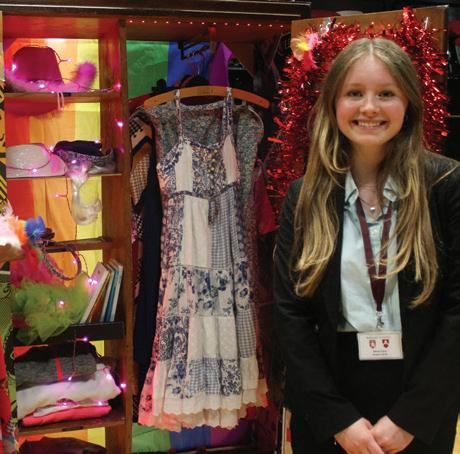
Students have a weekly enrichment lesson on a Friday afternoon. The offering is broad and varies each year but may include:
• Woodland Conservation
• British Sign Language
• Medics’ Preparation
• Survival Cookery
• Politics
• Mural Workshop
• Performance
• Jewellery Making
• Music Technology
Students are encouraged to pursue a range of supplementary activities to enhance their personal profile and support their future beyond Bablake.
All students embark on the EPQ (Extended Project Qualification), an extended piece of accredited research chosen to stimulate intellectual curiosity and develop academic skills through the exploration of a topic outside the curriculum. Highly valued by universities and employers, it enables students to become more critical, reflective, and independent learners and help prepare for the demands of university work.
Additionally, students can complete the Gold CREST Award, take part in Industrial Cadets or Young Enterprise, and sit national subject challenges such as the Biology, Chemistry and Physics Olympiads.
A dedicated careers advisor offers individual guidance and support to all students. A comprehensive programme, including a wide range of workshop with industry leaders, ensures all students are fully prepared for their next steps. All students will have opportunities to practise interview techniques with expert panels.
The Senior Medical Society, Law Society and the Oxbridge Preparation Programme enable significant numbers of students to progress onto highly selective courses.



There is a wide range of co-curricular opportunities available; something for everyone!
Opportunities include, Duke of Edinburgh (DofE) Award, Combined Cadet Force (CCF), Debating, music ensemble, drama productions, INC Society, F1 in Schools, sport, subject lectures, workshops, visits and so much more!
Bablake has a national reputation for our sport provision. With students representing the region or even the UK, we are able support highly talented individuals. We aim to provide many opportunities for students to participate in sport and gain lifelong love of exercise. All Sixth Formers are expected to take part in weekly games sessions with a wide programme on offer including access to our state-of-the-art fitness suite. There are many opportunities to represent the school in team and individual sports.
There are many opportunities for Bablake Sixth Formers to develop their leadership skills through a variety of roles such as Form Prefects, Subject Ambassadors, House Prefects, as well as running drama productions and clubs for younger pupils.
There is a Sixth Form Council run by students and a Senior Prefect team who provide a vital link between students and staff.
Students are encouraged to give back to their community by participating in charity and voluntary work. In the Lower Sixth, students volunteer in a range of settings including primary schools, care homes, charity shops and hospitals and work towards the Young Leaders in Service Award run by The Lions.





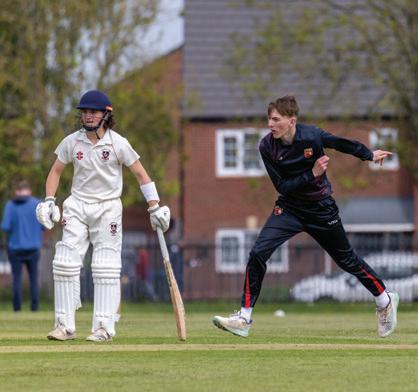
Exam board: Eduqas
Head of Department: Mr P Cleaver
Art is one of the few subjects where you can explore your own ideas and interests. Increasingly a creative flair and the ability to think independently to come up with new or radical solutions to problems is becoming a valued and desirable commodity in a range of courses and professions.
Gallery visits are undertaken as part of the course with the opportunity to also benefit from the established practice of life drawing sessions. Working with practising artists is a key feature and we maintain links with former students who visit to give up to date information on the courses they are studying.
Grade 6 in GCSE Art.
Most of our entries are in the fine art endorsement. This allows for a range of experiences to be covered during the course from drawing and painting, textiles, printing, photography, sculpture, ceramics and graphics. If you wish to specialise, you may be entered for an endorsed course such as Textiles or Fine Art.
We use the first term to explore techniques, developing skills, investigating ideas and ways of interpreting the world around us. You will then decide on the theme for your main coursework project. This is a practical unit of work supported by a written study which together makes up 60% of the total mark. The exam is 15 hours in duration and accounts for the remaining 40% of the marks.
The creative arts are a major employment area - careers in architecture, advertising, book illustration, fashion and fashion merchandising, interior design, games design, theatre and film.


Exam board: OCR Head of Department: Mr A Hall
Biology is a constantly evolving subject with innovative and ground breaking discoveries being made on a daily basis. If you enjoy a subject that is based on facts but which also allows you to develop your research skills and wider appreciation of biological concepts then this is the A Level for you.
Grade 7-9 in Biology IGCSE/GCSE or Combined Science. It is also strongly recommended that you have a good grade in Chemistry.
• Cells
• Exchange surfaces
• Biochemistry
• Ecology
• Animal and plant transport
• Genetics
• Communication and homeostasis.
Biology may lead to a varied choice in degrees and careers as well as the more obvious choices of Medicine, Veterinary Science, Biochemistry, Genetics and Ecology.
Exam board: Edexcel
Head of Department: Mr R Rawlins
Immerse yourself in real world business and global commerce. Understand the world around you from marketing to business failure: the success of Domino’s Pizza; Coca Cola’s big marketing mistake; the legitimacy of Uber; and discover what Tesla actually do – they do not make cars!
Challenge yourself to grapple with the big business problems of the day which might involve a taste test; investigating Dyson’s decision to start making cars and considering Bablake’s marketing and hierarchy.
Grade 6 in GCSE Mathematics and English Language. You do not need to have studied Business before.
• Marketing, People and Global Business
• Business Activities, Decision and Strategy
• Investigating Business in a Competitive Environment
Business will prepare you to work with others, in an organisation or indeed setup by yourself. This means it is useful for all career paths but will specifically help you into marketing, banking, finance, accountancy, management consultancy, self-employment, international business, not-forprofit charities and NGOs.


Exam board: AQA
Head of Department: Mr I Kalsi
Study Chemistry if you would like a qualification that reflects your strengths at analytical thinking, problem solving, dexterity, numeracy and intellect. You will need Chemistry A Level if you want to go on to university and study a subject with Chemistry in the degree title, or Pharmacology, Medicine, Veterinary Science or Dentistry.

Grade 7-9 in IGCSE or GCSE Chemistry or Combined Science. In addition, grade 7-9 in Mathematics is strongly advised.
• Physical Chemistry – with numbers and calculations
• Organic Chemistry – the chemistry of carbon compounds

Inorganic Chemistry – the chemistry of the elements that are not carbon








A qualification in Chemistry can lead to careers that directly involve the subject, such as research science, forensics, medicine and teaching. However, with most academic subjects the majority of graduates go on to a career that does not directly relate to their discipline, such as in the financial sector.



Recent Bablake alumni have gone on to study Chemistry, Medicine and Veterinary Medicine at Russell Group universities.


Exam board: OCR
Head of Department: Mr D
Menashe
In Classical Civilisation you will study literature, history, culture and philosophy – the variety of subject material means this is a subject highly valued by universities and employers. You will read some of the most influential and entertaining poems and plays in world literature in translation, and develop your ability to research, collate and analyse materials and learn to critically evaluate sources in order to formulate arguments.
Students can take this subject without having studied it at GCSE, but for those that have, the minimum requirement is a grade 5.
• Epic literature – the study of Virgil’s Aeneid and Homer’s Iliad or the Odyssey
• Ancient theatres, dramatic festivals, comedy and tragedy
• A study of the literature and philosophy on love and relationships in the Greek and Roman world
Classical Civilisation develops skills needed for many courses at university. Some students go on to study the subject at university, or a related subject such as Ancient History or Archaeology. Others go on to study English, History, Law, Philosophy or Drama related courses. Equally, other students study it in conjunction with STEM subjects to give them an excellent skills base.


Exam board: OCR
Head of Department: Miss R Blattner
Computer Science is your life and your future – be a part of it by understanding how computers work and how to make them do the things you want them to do. One of the most important aspects is problem solving, which is an essential skill for life. As well as being theoretical, Computer Science is a very creative subject where you get to be a creator and an innovator.
Grade 7 in GCSE Computer Science. You must have some programming experience in a scripting language such as Python, Visual Basic, Java or C#. You need to be a confident mathematician, someone who is able to think logically and who loves solving problems.
• Component 1 – Computer Systems (40%) –Types of processors, input/output/storage devices, systems software and applications software, software development and programming, networks, web technologies, databases, data structures, Boolean algebra, legislation, legal and ethical considerations
• Component 2 – Algorithms and programming (40%) – thinking abstractly, thinking logically, thinking ahead, thinking concurrently, thinking procedurally, problem solving.
• Component 3 – Programming project (20%) – you get to create your own computer program to solve a problem and then write about it. You could create a new game or solve a problem for someone you know.
Computer Science is great preparation for degree subjects in Engineering, Physics, Computer Science, Games Design and Maths. However, it also opens the door to other subjects such as design and manufacture, music production, graphic design, robotics and artificial intelligence to name but a few.
Exam board: AQA
Acting Head of Department: Mr P Nicholson
Design Technology is a creative and thought provoking qualification that gives you the practical skills, theoretical knowledge and confidence to succeed in many careers, especially those in the creative industries. You will investigate historical, social, cultural, environmental and economic influences on design and technology, whilst enjoying opportunities to put your learning in to practice by producing prototypes of your choice. You will also gain a real understanding of what it means to be a designer, alongside the knowledge and skills sought by higher education and employers.
Preferably a grade 7 in a GCSE design subject. However, enthusiasm, an interest in design and a desire to develop your creative side goes a long way.
YEAR ONE
• Technical principles of materials and their components including wood, metal, polymers, compliant, smart and composites.
• Consider how to use these materials appropriately, how to join them together, manufacturing processes, enhance their properties and apply an appropriate finish
• The requirements for product development including aesthetics, ergonomics, anthropometrics and marketing.
You will undertake a significant piece of project work which reflects:
• Design and making principles to include the use of a design process, influential design movements and designers, cultural changes and how they can influence the work of designers.
• Project design and management to include life cycle of a product and social and environmental issues, the appropriate use of tools and equipment and the testing and evaluation of a solution.
There are many options to take this subject further at university degree level centred around product and industrial design. Students in recent years have been accepted on designbased courses at Brunel, Loughborough, Nottingham Trent and other top universities. Taken in conjunction with Physics and Maths, there is a whole range of engineering courses available too. Design and Technology can also be extremely helpful in pursuing many of the exciting apprenticeship and graduate schemes in industry.


Exam board: OCR
Head of Department : Mr R Rawlins
Study one of the most influential, dynamic and well-respected disciplines available. In Economics you will gain insight into the economic world around you and forces that will shape your future.
Grade 6 in GCSE Mathematics and English Language.
• Markets: from chocolate to fireworks to healthcare; consumer choice and government intervention; monopoly and contestability.
• The national and global economy: growth in the UK, development in sub-Saharan Africa.
• Trade: poverty to prosperity.
• Finance
• Share dealing
• Banking
• Management
• Accountancy
• Law
• Development Strategy
• International trade
• Advisory
• Academia
Exam board: AQA
Head of Department: Miss F McClean
English Language is the only subject with a sole focus on communication: the production and reception of both written and spoken English. This is a handson course that requires you to engage and reflect on your own language use and that of others around you. The coursework module enables you to investigate any topic of interest to you as well as choosing any type of original writing – from stories to articles and everything in-between.
Grade 6 in English Language IGCSE/GCSE provides good foundations for the course.
• How gender influences language use and is represented e.g. in the media
• How regional background affects language use and the stereotypes associated with this
• How occupation impacts language use and is linked to power
• The future of English as a global language
• Children’s language development from birth to 11 (both spoken and written)
• The evolution of the English language over the past four centuries
• Coursework module (Language Investigation and Original Writing)
The focus that English Language has on both spoken and written communication makes it highly valuable for any course or job which relies on this.
English Language students have also gone on to study degrees in: Creative Writing, Journalism, Law, Medicine, Accountancy, Education, Management, Business, Psychology and Policing, amongst many others.


Exam Board: OCR
Head of Department: Miss F McClean
If you are passionate about reading and enjoy discussions of literature in your GCSE classes, you will thrive in your study of this A Level.
An A Level in English Literature is highly regarded by universities (indeed, it is one of the most popular choices of students who attend Russell Group universities); it also complements a diverse range of A Level subjects.
Grade 6 in English Literature IGCSE/GCSE.
• Paper 1 Drama: ‘Othello’ and ‘A Streetcar Named Desire’
• Paper 2 Prose: Two novels, e.g. ‘Frankenstein’ and ‘The Handmaid’s Tale’
• Paper 3 Poetry: ‘Poems of the Decade’ Anthology 2001-2010; Christina Rossetti; modern unseen poetry
• Coursework: Comparative essay of two texts (e.g. ‘The World’s Wife’ by Duffy and ‘Rebecca’ by Du Maurier)
Strong written and communication skills are highly valued by all employers and these can open a huge variety of potential career paths. Popular industries include journalism, media and publishing. You could get a job in film or television; you could work on the writing, editing and production of magazines and newspapers; you could go into advertising, PR and marketing. You could also enjoy an academic career in teaching or lecturing. Students also go on to careers in professions such as law, business, accounting and finance.
Exam Board: Cambridge International Examinations
Head of Department: Mrs J MacGibbon
Geography is a “living” subject – contemporary and always changing, and certainly never dull. Knowledge of how the world works is vital regardless of the area of employment you end up in – we live in a globalised world and those who do not understand it risk being left behind. It also combines well with any other subjects such as arts or science.
Best of all, it is the only subject on offer where you are able to sit an AS exam that counts toward your overall A Level in November of Upper Sixth, thus taking the pressure off at the end of the course.
Grade 6 at GCSE, but it is possible to take A Level Geography even if you haven’t studied the subject at GCSE.
This course retains an AS/A2 structure where all four examinations (AS Physical, AS Human, A2 Physical, A2 Human) contribute equally to the overall qualification.
Six compulsory units at AS, examined in November of the Upper Sixth Year (please note that one, or sometimes both, of these examinations take place during the two week October half term, giving students ample opportunity to prepare with minimum pressure).
• Rivers and Hydrology
• Atmosphere and Weather
• Rocks and Weathering
• Population
• Migration
• Settlement
Four compulsory units at A2 (two exams):
• Coastal Environments
• Hazardous Environments
• Environmental Management
Geographers are in high demand. Employers actively recruit Geography graduates because of the range of skills they can offer in the workplace – numerate, literate, good team workers and able to think analytically and critically.
Possible careers include: environmental science, geology, energy, meteorology, geophysics, oceanography, surveying, hydrology, engineering, retail and industrial management, banking, town and country planning, transport consultancy, commerce, banking, systems analysis, media and journalism, architecture, landscape design, cartography, surveying, graphic design, airline pilot, international development…and more.




Head of Department: Mrs C Rees
History is endlessly fascinating, because people are endlessly fascinating; studying history allows you to reach back in time and meet them. You will learn crucial skills of analysis, evaluation and argument.
Grade 6 in GCSE History although it is not essential. If you are good at English, Religious Studies or Geography, you will have the skills to be successful in History.
• England 1485-1558: The Early Tudors (British period study)
• The French Revolution and the rule of Napoleon 1774-1815 or Italy 1896-1943 (Non-British period study)
• Russia and its Rulers 1855-1964 (Thematic study and historical interpretations)
• Essay based on the topic of the Arab-Israeli Conflict (NEA 20%)
The skill set acquired by studying History is particularly useful for careers in areas such as Law, Business, Marketing, Human Resources, Journalism, Management and the Civil Service as well as more vocationally related careers such as Teaching, Librarianship, Research and the Heritage Industry.
Past students have taken courses ranging from subjects such as Medicine, Physics, Computer Science, Accounting, Biochemistry, Veterinary Science and Genetics to more obvious subjects such as History, Law, English, Geography, Archaeology, Languages, Art History and Classics.
Exam Board: OCR
Head of Department: Mr D Menashe
Latin A Level give you the chance to study some of the most important and influential literature ever written. It is highly valued by universities and employers as showing high order skills of logic and analysis. You will learn to critically evaluate information to formulate arguments.
Grades Required
Grade 7 in Latin.
• Understand and analyse two prose set texts, each of around 225 lines.
• Understand and analyse two verse set texts, each of around 225 lines.
• Translation and comprehension of unseen passages of Latin prose and verse.
Many universities offer degrees in Latin or Latin and Greek (widely known as Classics). Oxbridge Classics courses have the highest ratio of acceptances on their courses of all subjects with around 45% of applicants gaining a place.
In recent years, students have gone on to careers in IT, Teaching, Civil Service, Media, Journalism, Acting and Archiving. Many students who have studied Latin have gone on to study Medicine, Engineering, Maths and other STEM subjects at university.


Exam Board: OCR
Head of Department: Mr D Lovell
Law is the overarching framework that supports our society and protects our liberty and freedoms. The study of Law develops skills in problem solving, logical analysis and application. It is an excellent foundation for a Law degree or to support higher level studies in other subjects. We have a great programme of trips, activities and guest speakers to bring the subject to life.
Grade 7 in either GCSE English, History or Religious Studies.
• Legal system and law making
• Criminal law
• Tort law
• Contract law
• Barrister/Solicitor
• Politics
• Business/Management
• Criminology/Forensics
Law is available to Bablake students to study at King Henry VIII School.
Exam Board: Edexcel Head of Department: Mr K Tyas
Mathematics at A Level is a continuation of GCSE but considerably more challenging. At A Level we continue to look at algebra, geometry and statistics but we also explore new branches including calculus and mechanics.
Grade 7 in Mathematics.
• Pure Mathematics – the building blocks of the subject, such as calculus, number theory, analysis.
• Statistics – interpreting data, correctly!
• Mechanics – the effects of forces acting on bodies in practical situations
Universities will expect A Level Mathematics for most Science, Engineering, Mathematics and Economics courses and the best universities will expect Further Mathematics for these courses.

Exam Board: AQA
Head of Department: Mrs K Parsons
Studying a language at A Level enhances your communication skills, which will enhance your employability in an international market. You will gain a much wider understanding of the culture as well as of the language that you are studying.
Grades Required Grade 7 at GCSE/IGCSE.
YEAR 12
• Aspects of French-speaking society – the changing nature of the family; the digital world; the place of voluntary work.
• Artistic culture – the cultural diversity of France and its heritage; contemporary francophone music; cinema: the 7th art form.
• Film analysis – students’ study one film from a prescribed list.
YEAR 13
• Aspects of French-speaking society – positive features of a diverse society; life for the marginalised; how criminals are treated.
• Political life – teenagers, the right to vote and political commitment; demonstrations, strikes – who holds the power? Politics and immigration.
• Literary text – students study a text from a prescribed list.
YEAR 12
• Aspects of German-speaking society – the changing nature of the family; the digital world; youth culture.
• Artistic culture – festivals and traditions; art and architecture; cultural life in Berlin, past and present.
• Film analysis – students’ study one film from a prescribed list.
YEAR 13
• Aspects of German-speaking society – immigration; integration; racism.
• Political life – Germany and the European Union; politics and youth; German re-unification and its consequences.
• Literary text – students study a text from a prescribed list.
YEAR 12
• Aspects of Hispanic society –Modern and traditional values; cyberspace; equal rights.
• Artistic culture – modern day idols; Spanish regional identity; cultural heritage or cultural landscape
• Film analysis – students’ study one film from a prescribed list.
YEAR 13
• Aspects of Hispanic society –immigration; integration; racism.
• Political life – today’s youth, tomorrow’s citizens; monarchies, republics and dictatorships; popular movements.
• Literary text – students study a text from a prescribed list.
Studying a language at A Level opens a whole new world to you. The first step would be to study languages at undergraduate level, either as a pure language course or combined with another subject, such as Law or Economics. Following this path would allow you to study abroad for a year at degree level, which is not only a fantastic experience but will help you to become fluent in the language that you are studying.
Post-degree, the skills that you have developed will make you employable across a range of sectors including journalism, broadcasting, government (e.g. the Diplomatic Service), tourism, international logistics or sales, interpreting, patent law or teaching.
Exam Board: Eduqas
Head of Music: Mrs S Glover
If you are passionate about learning the process and skills behind music then this course is for you. You will develop your performance skills by playing a range of music as a soloist and/or as an ensemble member. There are opportunities to develop your composition skills and further develop your musical understanding by studying set works.
Success at GCSE Music and instrumental/vocal skill of at least grade 5/6 at the start of the course.
• The Western Classical Tradition focussing on the development of the symphony 1750 – 1900.
• Choice of Rock & Pop, Musical Theatre or Jazz.
• Choice of Into the Twentieth Century and Into the Twenty-first Century.
The coursework is worth 60% of the final grade and is made of performances and compositions. The students have the option of doing more performing or more composing and making one worth a greater percentage of their final mark.
The skills developed on this course are transferable and will prepare students not only for careers in music such as: professional musician, composer, conductor, teacher, music therapist or private tutor. There are other career options in the arts/creative industries, and this might include work in film, TV, theatre, radio, arts administration or creative education.

Professions such as medicine, law, accountancy also regard Music as an academic subject and it could make you stand out on your application.
Exam Board: OCR

Head of Department: Miss S Burton
If you have ever watched the news, and wondered how and why events are happening, analysing the systems and philosophies that lead to these outcomes means that we can answer these questions. If you are curious about global and domestic current affairs, then Politics is the subject for you.
At the very core of the subject, topical lessons bring the subject to life within a friendly environment that fosters lively debate and encourages you to challenge your ideas. In Politics A Level you will build skills in using evidence to unlock theory, evaluate, and construct well justified conclusions.
Grade 6 in GCSE English Language with recommended grade 6 in one of either History, Religious Studies or Geography.
The course covers government and politics of the UK and the USA, making comparisons between the two systems and using current affairs to see how they operate in practice. This is underpinned by the study of political ideas such as conservatism, liberalism, socialism, and ecologism, with in-depth study of key thinkers such as Ayn Rand, John Stuart Mill and Karl Marx, to name but a few.
Students go on to study a wide range of degree courses, nationally and internationally, since by its very nature it teaches us to engage with the world around us. It is well regarded by both Russell Group and Oxbridge universities.
Common pathways include:
• Politics and International Relations
• Civil Service
• Journalism
• Law
• Marketing Politics is available to Bablake students to study at King Henry VIII School.




Exam board: Edexcel
Director of Performing Arts: Mrs J Berg
This is one of the only subjects that requires frequent creative teamwork and enables students to develop communication skills. The exploration of plays demands and develops skills of problem-solving, analysis, creativity and empathy. This A Level is academically rigorous and demands a high level of theoretical understanding.







Grade 6 in GCSE English. Prior Drama Studies at GCSE is not a requirement, however a passion and genuine interest in live performance is essential. Not all students who take Drama and Theatre at A Level are performers; it is possible to complete the course as a designer of light, sound, costume or set.





You will begin by building and shaping their ensemble, through exploration of the fundamental skills of Drama and Theatre.
• Component 1: 40% Devised performance or developed design work and written portfolio (internally assessed).
• Component 2: 20% performance exam with visiting examiner. Students will develop performance or design work for 2 extracts from existing play texts.

• Component 3: 40% written exam: Students will explore two set texts from the perspective of both actor, designer and director. Additionally, they will learn how to evaluate the impact of live performances they see during the course, which will also inspire devising work completed in class. .



































This course provides students with the understanding, knowledge and skills needed for study at higher educational institutes and specialist Drama colleges. It offers a strong and flexible foundation for a career within and beyond theatre.





The skills that are developed can also be used in many other areas, for Drama and Theatre students often do well at interviews and other situations that need you to communicate. This also goes for careers such as Journalism, Law, Public Relations, Teaching, Politics, TV and Film Production.










Exam Board: OCR
Head of Department: Mr A Phillips
If you have an enjoyment of participating in sport and a wish to learn the theory behind sporting success then this A Level is for you. The course covers a wide range of theory, including many new areas of study, which you will be able to link to an area you enjoy – sport! The practical side will enable you to benefit academically from your sporting excellence and improve your ability to evaluate your own performance and that of your teammates.
• Exercise Physiologist
• Sports Psychologist
• Fitness Industry
• PE Teacher
• Sports Administrator
• Sports Coach
• Sports Development Officer
• Physiotherapy
• Sports Therapist
• Sports Marketing
• Sports Business
• Sports Technology Development
• Professional Performer

• Analyst




Grades Required





Notable Bablake alumni include Dan Mousley (Warwickshire CCC, Birmingham Phoenix and England), Hollie Wilkinson (England Hockey international) and Dom Rae (British Junior Body Building Champion).





Grade 6 in GCSE PE, and a grade 5 or above in Biology would be an advantage. A good level of practical ability in one major sport.


• Anatomy and Physiology
• Exercise Physiology
• Skill Acquisition
• Sport Psychology
• Biomechanics
• Sport in Society








The course carries a NEA weighting of 30% (15% practical in one sport and 15% Evaluating and Analysing Performance for Improvement).






• Contemporary Issues in Physical Activity and Sport
• Sports Performance, Evaluation and Analysis




Exam board: AQA
Head of Department: Dr S Johnson
Physics is one of the most demanding A Level courses, yet it can engender a great sense of achievement when concepts are mastered. It helps us to explain so many physical phenomena that we encounter everyday in our normal lives and physical phenomena that we don’t encounter in our everyday lives. There are so many aspects of the subject for which active research still needs to be undertaken to explain why certain processes happen in the way that they do.
Grade 7-9 in IGCSE or GCSE Physics or Combined Science. Additionally, you require a Mathematics GCSE of at least grade 7.
• Particle Physics
• Electricity
• Mechanics
• Waves
• Gravitation
• Electric Fields
• Magnetic fields
• Circular motion and Simple Harmonic Motion
• Thermal Physics
• Nuclear Physics
• Option topic: one from Astrophysics, Medical Physics, Engineering Physics, Turning Points in Physics or Electronics.
Employers consider a Physics A Level as an indication that a student has taken a subject with academic rigour. It is not just the Science and Engineering careers that appreciate a candidate with a Physics A Level (or degree).
Physics, Astrophysics, Medicine, any science, any engineering discipline, apprenticeships in any science or engineering career. Many students also go on to careers in the financial sector or law/journalism.

Exam Board: AQA
Head of Department: Mrs J Barratt

Psychology is the opportunity to learn about the scientific study of the mind and behaviour. It is a subject that develops the ability to carry out scientific research, critically analyse arguments and evidence, test hypotheses, make informed judgments and write with clarity and concision. This A Level will suit you if you are determined to understand human motivations and actions, and to utilise this understanding to help address many of the problems and issues in society today.
Grade 5 in GCSE Maths, English and grade 6 in one Science.
• Approaches in Psychology
• Biopsychology
• Research Methods
• Social Influence
• Memory
• Attachment
• Psychopathology
• Issues and Debates in Psychology
• One from: Relationships; Gender; Cognition and Development
• One from: Schizophrenia; Eating Behaviour; Stress
• One from: Aggression; Forensic Psychology; Addiction
Psychology is ranked second in popularity of degree courses in the UK, behind Mathematics. A degree in the subject is highly thought of by many employers with over 750,000 people in the UK currently working in an area which involves Psychology as part of their role. Careers in Psychology can be found in countless fields, from health care and public service to education, business, technology and more.
The skills gained through studying Psychology will provide long reaching benefits during A Level and beyond; in addition to satisfying your own interest in human nature, having a solid understanding of what makes people do certain things can be a very marketable skill in a wide variety of job settings, including advertising, marketing, education, health care and politics.
Exam Board: WJEC/Eduqas
Acting Head of Department: Mrs A Tumber
Religion, Philosophy and Ethics will help you think more deeply about the meaning of life! You will develop a range of skills – of reflection, evaluation, reasoning and synthesis – highly suited to many professions, including the Law, Politics and Medicine.
No prior study is required (though a GCSE in Religious Studies/Philosophy will help).
• Philosophy: including arguments for and against God’s existence.
• Ethics: including different ethical theories and issues, such as medical ethics, sexual relationships, human rights, genetic engineering and nuclear warfare.
• Buddhism: including basic teachings, different schools, meditation, and Buddhism and Western culture.
Very few RPE students go into something ‘religious’. The skills, breadth of mind and cultural reference you will acquire through studying this A Level will make you a valuable asset to any employer. Obvious career paths would include the Law, Politics, Medicine, Human Resources, Creative Arts and Teaching.

General minimum entry requirement: five GCSE passes at grade 6 or above with a grade 7 preferred in subjects to be studied at A Level and required in certain cases.
Please refer to the subject information for the specific requirements for each course.
A number of Academic, Art, Performing Arts and Sports scholarships are available for Sixth Form entry. These are open to both current students and applications from outside Bablake.
ACADEMIC SCHOLARSHIP
For the Academic Scholarship, an applicant should be capable of achieving, and be predicted by his/her school to achieve 9/8 grades in all the subjects at GCSE that are chosen for A level. Scholars will almost without exception gain a majority of 9/8 grades in their GCSE subjects.
Those applying for an Academic Scholarship will also sit a written test and be interviewed.
ART SCHOLARSHIPS
Students wishing to be considered for an Art Scholarship will need to show considerable natural ability and will have begun to reach high standards of proficiency in their creative work in terms of technique, development of ideas and their understanding of the subject.
We will be looking for enthusiastic individuals who make Art a major part of not only their school life but also their free time, and are able to respond to the creative possibilities of the subject.
Students interested in applying for an Art Scholarship will need to send a letter to the Headmaster along with a portfolio of recent work.
PERFORMING ARTS SCHOLARSHIP
For the Performing Arts Scholarship, an applicant should have a specialism in Music, Drama or a combination of both. They must be able to demonstrate performance skills equivalent to Grade 6 on an instrument, in musical theatre or in acting. The applicant should also be able to demonstrate significant exposure and experience in performance, as well as an enthusiasm to be involved in all aspects of the Performing Arts at Bablake.
Students interested in applying for a Performing Arts Scholarship will need to send a letter to the Headmaster, with information about instruments played, grades achieved and orchestral/choral involvement or evidence of performance in musical theatre or in acting.
For the Sports Scholarship, an applicant should be achieving a high level of performance, County level or equivalent in any major sport offered by the School, and should also demonstrate leadership qualities and a commitment to school sport.
Students who would like to apply for a Sports Scholarship will need to send a letter to the Headmaster which should include their sporting achievements, leadership credentials, cocurricular activities, GCSE subjects being studied and intended A Level choices.

Bursaries are means-tested and awarded based on financial need and academic ability. They are offered to students whose parents can contribute to fees but who are unable to meet the full fees.
Bursaries which are already held by current students are continued into the Sixth Form, subject to the usual assessment of income and any other rules governing these schemes.
Further information can be found on our website or by contacting our Admissions Team on 024 7627 1248.


Please apply using our online application form on our website.
Interviews with the Headmaster will take place in the Spring term.
If you have any queries, please contact our Admissions team on 024 7627 1248 or bablakeadmissions@csfoundation.org.uk who will be happy to help.
Friday 31 January